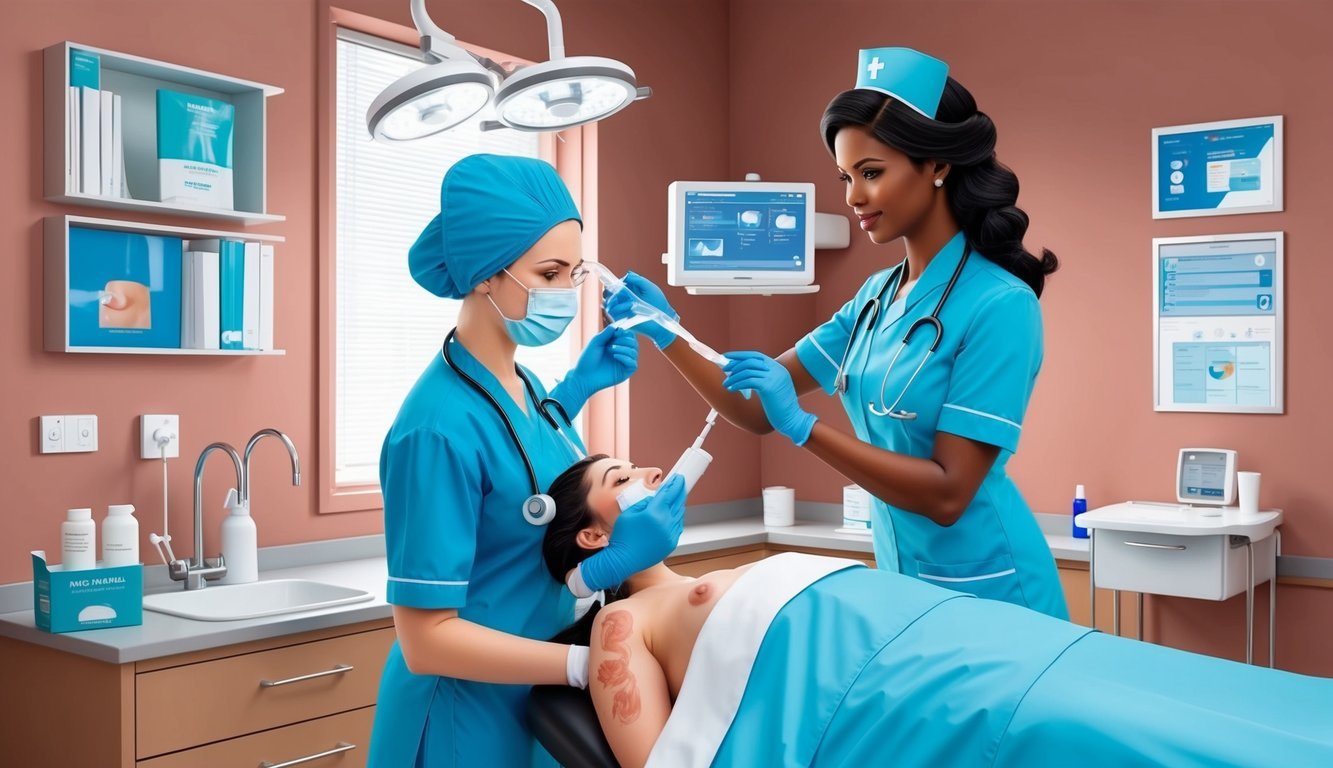Dermatology nurses play a vital role in patient care by specializing in skin health and treating various conditions.
These professionals not only help patients regain their confidence but also enjoy strong job security and competitive salaries.
Whether you’re considering a career change or exploring nursing options, understanding the responsibilities and opportunities available in this field is crucial.
To become a dermatology nurse, you’ll need to build specific clinical skills while gaining experience in a variety of healthcare settings.
This career offers numerous paths for growth and advancement, catering to those seeking to specialize further or take on leadership roles.
In addition to job satisfaction, dermatology nurses can expect a favorable job outlook and good compensation, reflecting the increasing demand for skin specialists in healthcare today.
Key Takeaways
- Dermatology nurses are essential in managing skin health and improving patient well-being.
- There are various paths for career advancement in dermatology nursing.
- Competitive salaries and strong job security make this a rewarding career choice.
Becoming a Dermatology Nurse
To become a dermatology nurse, you will need to follow a structured pathway involving education, licensure, and potential specializations.
This role requires a solid foundation in nursing principles, along with specific training in dermatology.
Educational Pathways
Your journey begins with obtaining a nursing degree.
You can choose between an Associate’s Degree in Nursing (ADN) or a Bachelor of Science in Nursing (BSN).
| Degree Type | Duration | Notes |
|---|---|---|
| Associate’s Degree | 2 years | Prepares for entry-level nursing roles. |
| Bachelor’s Degree | 4 years | Offers broader training and career options. |
Both paths require you to complete a nursing program that includes clinical training.
After your degree, you must pass the NCLEX-RN to obtain your RN license.
This license is crucial for practicing as a registered nurse and is a stepping stone for further specialization in dermatology.
Licensure and Certification
Once you earn your RN license, consider pursuing additional certification in dermatology nursing.
To become Dermatology Nurse Certified (DNC), you will need to complete specific courses and gain experience in dermatology settings.
Certification involves:
- Completion of a recognized dermatology nursing program
- A minimum number of clinical hours in dermatology practice
- Passing an examination to demonstrate your knowledge and skills.
These certifications enhance your qualifications and may improve your job prospects and earning potential.
Specializations within Dermatology Nursing
Within dermatology nursing, you can explore various specializations.
These might include roles in cosmetic dermatology, wound care, or dermatological surgery.
Common specializations include:
- Pediatric Dermatology: Focus on skin conditions in children.
- Cosmetic Dermatology: Involves aesthetic procedures and client education.
- Dermatologic Surgery: Assists surgeons in procedures related to skin conditions.
Each specialization may require additional training and certification.
By furthering your education in these areas, you can enhance your expertise and meet the diverse needs of patients.
Clinical Skills and Responsibilities

As a dermatology nurse, you play a vital role in patient care, emphasizing both medical and cosmetic dermatology.
Your responsibilities cover a range of clinical skills, including assessments, treatment procedures, and patient education.
The focus is to ensure patients receive the highest quality of care tailored to their skin health needs.
Skin Health Assessment
Conducting thorough skin health assessments is a key responsibility.
You will examine patients for various skin conditions, including acne, psoriasis, and skin cancer.
Attention to detail is essential as you document the size, color, and texture of lesions.
You will also perform skin exams and evaluate changes in existing conditions.
This may involve taking a patient history to identify risk factors.
If necessary, you may assist in biopsies to diagnose skin diseases or conditions accurately.
Proper assessment lays the groundwork for effective treatment planning.
Treatment Procedures
You will administer various treatment procedures to address skin conditions and enhance skin health.
Common treatments include light therapy for conditions like psoriasis and laser treatments for tattoo or hair removal.
Additionally, you may perform chemical peels or microdermabrasion to improve skin texture and appearance.
In cosmetic dermatology, you could administer Botox or other dermal fillers.
Understanding the appropriate procedures and potential side effects ensures patient safety and satisfaction.
You will also collaborate with dermatologists to customize treatment plans based on each patient’s specific needs.
Patient Education and Communication
Patient education is integral to your role.
You need to clearly explain treatment options and aftercare instructions.
Creating confidence in your patients helps them adhere to prescribed treatments, which can lead to better outcomes.
Communication is crucial.
You should actively listen to patients’ concerns and questions, ensuring they feel understood and cared for.
Use simple language when discussing complex medical terms related to skin conditions and treatments.
Providing resources on skin care routines and preventive measures further empowers your patients.
Emergency Response and Wound Care
Being prepared for emergencies is a critical aspect of your duties.
You may encounter skin injuries or severe reactions during treatments, requiring immediate attention.
Familiarity with burn units and wound care protocols can be lifesaving.
In cases of burns or severe skin injuries, you will assess the situation quickly and provide appropriate wound care.
This may include cleaning, dressing the wound, and monitoring for signs of infection.
Your ability to respond effectively will significantly impact patient recovery.
Staying updated on current best practices ensures you deliver high-quality care in all aspects of your role.
Career Advancement

As a dermatology nurse, you have many avenues for career advancement.
Enhancing your skills through specialty certifications, continuing education, and transitioning to advanced roles can significantly impact your career path and job satisfaction.
Specialty Certifications
Pursuing specialty certifications is essential for advancing in this field.
The Dermatology Nursing Certification Examination (DNCE) offered by the Dermatology Nurses’ Association (DNA) validates your expertise and enhances your credibility.
Certifications may include:
- Dermatology Certified Nurse (DCN)
- Dermatology Certified Nurse Practitioner (DCNP)
Gaining these certifications often leads to increased job opportunities and higher salaries.
Plus, many employers seek certified professionals for specialized roles, making certification a valuable asset.
Continuing Education and Recertification
Continuing education is vital in maintaining your license and staying updated with the latest advancements in dermatology.
Most states require nurses to complete a certain number of continuing education hours for license renewal.
You can engage in:
- Workshops and seminars
- Online courses
- Webinars
Recertification for specialized skills typically occurs every five years.
Staying current will not only help you retain your certification but also improve your knowledge and skills, making you more competitive in the job market.
Transition to Advanced Roles
Transitioning to an advanced role can open doors to new opportunities.
As a dermatology nurse, you may consider becoming a nurse practitioner or a clinical nurse specialist.
Both positions require additional education and training but come with greater responsibilities and higher pay.
To make this transition:
- Explore educational programs that focus on advanced practice in dermatology.
- Gain clinical experience in specialized dermatology settings.
- Network with professionals in your field to learn about job openings and mentorship opportunities.
Advancing to these roles can significantly enhance your career, allowing you to provide more comprehensive care to patients.
Employment Settings and Job Outlook

As a dermatology nurse, you will find diverse employment opportunities across various settings.
Understanding where you may work and the future demand for your role is important for shaping your career.
Hospital and Clinic Opportunities
Many dermatology nurses begin their careers in hospitals and clinics.
These environments allow you to gain valuable experience dealing with a range of skin conditions.
In hospitals, you might work in medical-surgical units or a dedicated dermatology department.
You will assist in surgeries, administer medications, and educate patients.
Clinics focus more on outpatient care, where you may perform skin assessments and provide treatment plans.
Positions in these settings benefit from a stable job outlook, with the Bureau of Labor Statistics predicting a 7% growth in registered nurses, including dermatology nurses, through 2029.
Private Practice and Cosmetic Dermatology
Private practices and cosmetic dermatology clinics offer specialized care, focusing on both medical and aesthetic procedures.
Here, you will engage with patients seeking treatments such as botox, chemical peels, and skin rejuvenation.
Working in these settings allows you to build closer relationships with patients, providing personalized care. Nursing experience in cosmetic dermatology can enhance your skill set and potentially lead to higher salaries.
As the demand for aesthetic procedures increases, the need for dermatology nurses in private practices is also expected to grow.
Research and Education
Dermatology nurses can also pursue careers in research and education.
If you are passionate about advancing the field, consider roles in clinical research, where you may work on studies that enhance treatment options.
In educational settings, you might teach aspiring nurses about dermatological care, sharing your knowledge and expertise.
Both research and education roles often require additional qualifications but can provide fulfilling career paths.
With ongoing developments in dermatologic care, these roles are anticipated to grow, supporting a bright career outlook for dermatology nurses.
For more information on job opportunities, consider exploring resources like the U.S. Bureau of Labor Statistics.
Compensation and Professional Satisfaction

Understanding the compensation and satisfaction levels in the dermatology nursing field is crucial for those considering this career.
You will find that salary expectations, factors influencing pay, and job satisfaction all play significant roles in shaping your experience as a dermatology nurse.
Salary Expectations
The average dermatology nurse salary varies based on location and experience.
As of 2024, dermatology nurses in Michigan earn approximately $85,140 annually, translating to about $40.93 per hour.
In contrast, nurses in Minnesota can make around $93,790 a year, or $45.09 hourly.
Different states and clinics will offer varying pay scales.
Here’s a brief table highlighting some average salaries:
| State | Annual Salary | Hourly Rate |
|---|---|---|
| Michigan | $85,140 | $40.93 |
| Minnesota | $93,790 | $45.09 |
| National Avg | $88,000 | $42.31 |
For the most recent stats, visit NursingProcess.org.
Factors Influencing Pay
Your salary as a dermatology nurse can hinge on several key factors.
Important aspects include:
- Experience: More years in the field typically lead to higher pay.
- Workplace: Salaries can vary significantly between hospitals and private dermatology clinics.
- Geographic Location: Urban areas often provide higher wages compared to rural settings.
- Education Level: Advanced degrees or special certifications might also increase your earning potential.
Incorporating these factors effectively can enhance your salary expectation.
Job Satisfaction and Impact on Quality of Life
Working as a dermatology nurse often leads to high job satisfaction.
Many find joy in helping patients with conditions such as hair loss and skin issues.
This can positively affect your self-esteem as you make a difference in people’s lives.
While the pay is important, the work environment and support from colleagues also significantly impact job satisfaction.
Positions in dermatology clinics tend to offer a more collaborative atmosphere, contributing to a more fulfilling work experience.
The combination of appropriate compensation and a supportive work setting promotes a positive quality of life for dermatology nurses.
For more insights, explore NursingEducation.org.
Frequently Asked Questions
This section addresses common inquiries about becoming a dermatology nurse.
You will find details about qualifications, responsibilities, salary expectations, and educational pathways.
What qualifications are required to become a dermatology nurse?
To become a dermatology nurse, you must first become a registered nurse (RN).
This typically involves earning a Bachelor of Science in Nursing (BSN) or completing a two-year associate degree program.
After that, you can pursue additional training or certification in dermatology nursing.
What are the primary responsibilities of a dermatology nurse?
Dermatology nurses provide care to patients with skin conditions.
They perform assessments, assist in treatments, and educate patients about skincare.
They also may help with procedures such as biopsies and laser treatments.
How does the role of a dermatology nurse differ from that of an aesthetic nurse?
While both roles involve caring for patients’ skin, dermatology nurses focus on medical conditions.
In contrast, aesthetic nurses primarily work on cosmetic procedures.
They may administer treatments like Botox or fillers, which are not typically within the dermatology nurse’s scope.
What is the expected salary range for a dermatology nurse in the United States?
The salary for a dermatology nurse can vary widely.
On average, dermatology nurses earn around $80,860 per year.
The pay can range from about $72,000 to over $132,000, depending on experience and location.
What educational path must one take to become a dermatology nurse practitioner?
To become a dermatology nurse practitioner, you need to complete an advanced nursing degree.
This often means earning a Master of Science in Nursing (MSN) or a Doctor of Nursing Practice (DNP).
Additionally, certification in dermatology as a nurse practitioner is recommended.
In which region do dermatology nurses typically earn the highest wages?
Dermatology nurses typically earn higher wages in urban areas or states with a high demand for healthcare workers.
Regions such as California and New York often offer the best salary opportunities.

